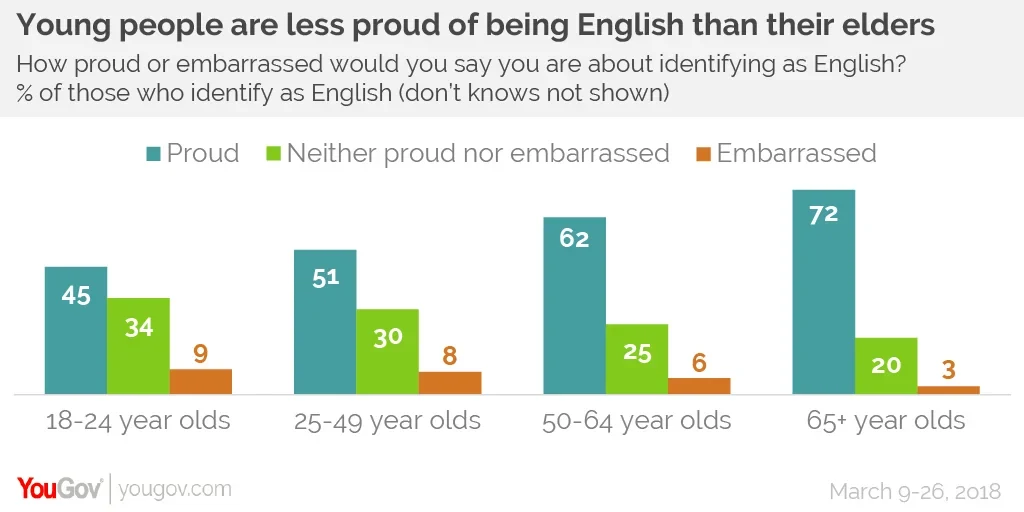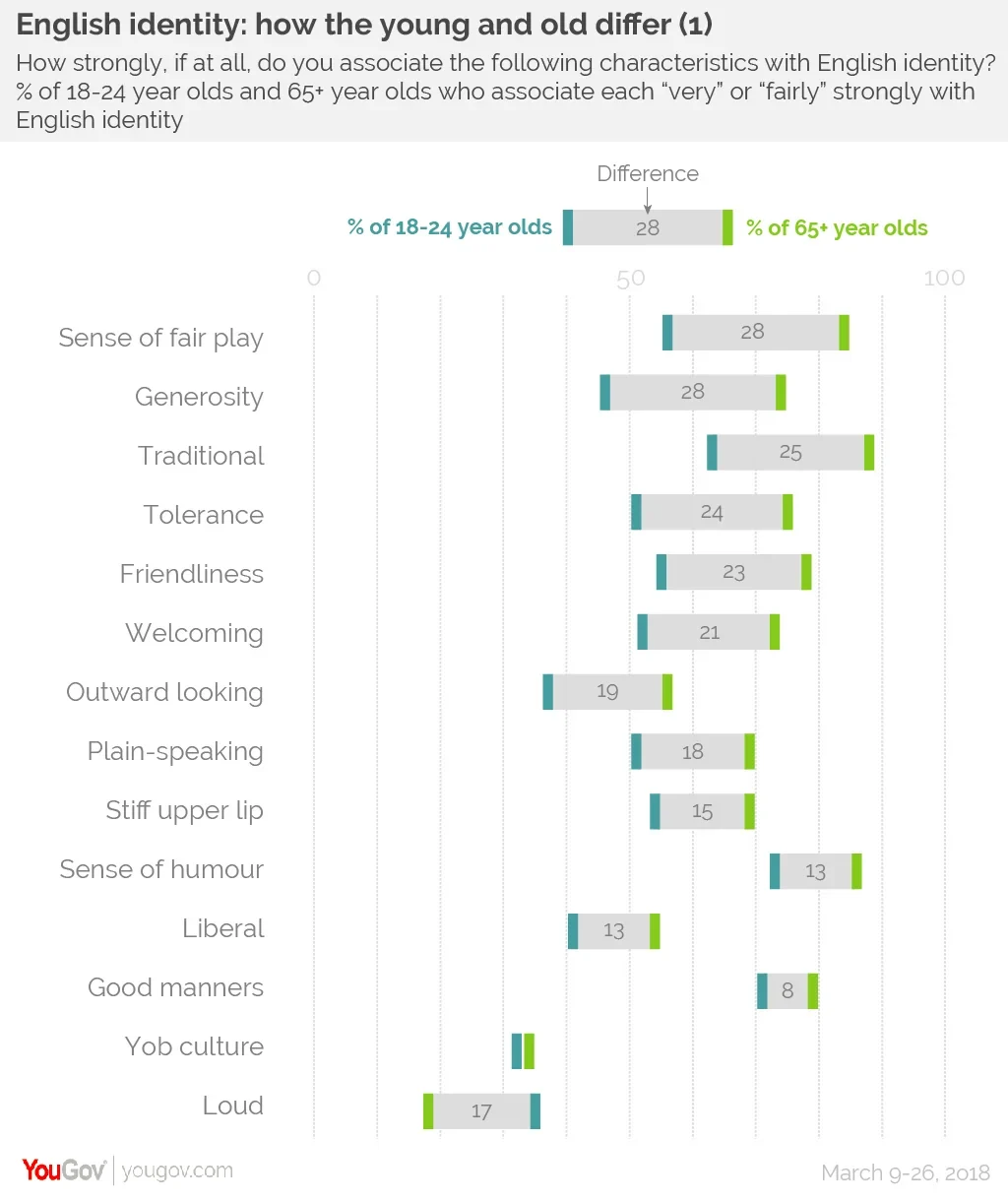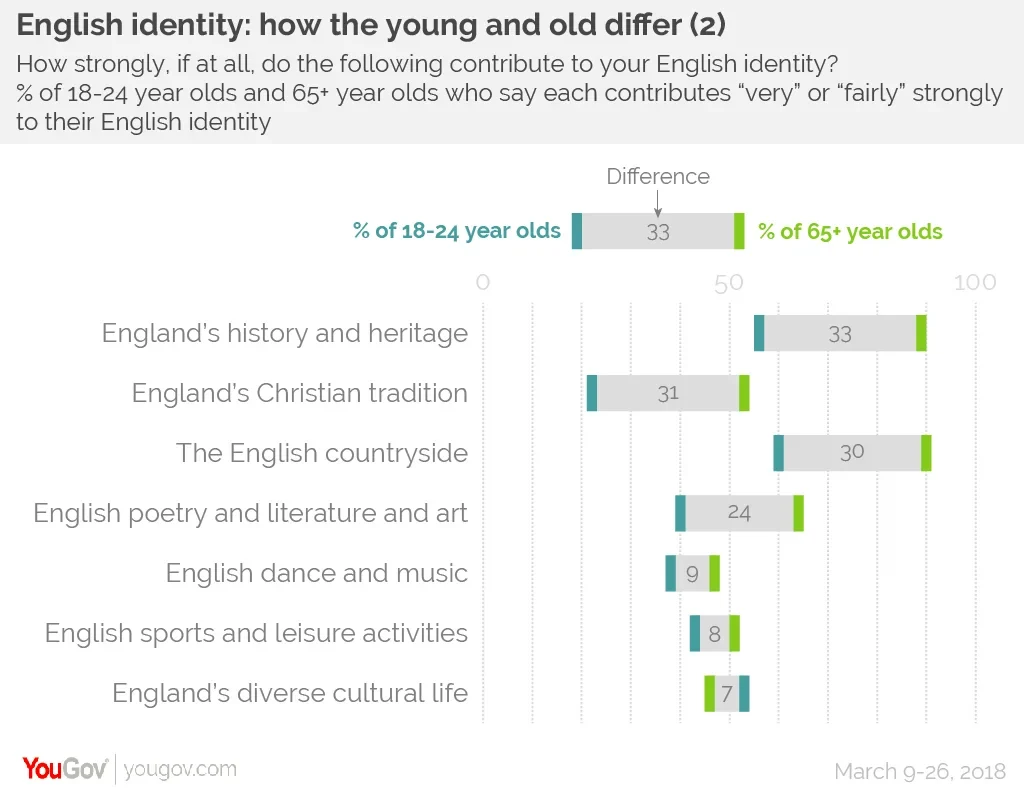Major YouGov survey reveals the extent to which the generations hold differing views on England and Englishness
A major YouGov study of more than 20,000 English adults, conducted for the BBC, reveals that young people in England are much less likely to be proud of their Englishness than their elder peers.
While approaching three quarters (72%) of people aged 65 and over who identify as English are proud of that identity, among 18-24 year olds that falls to just 45%. In fact, close to one in ten (9%) young people this age say they are actively embarrassed by their English identity, while a further 34% say they are neither proud nor embarrassed.

Nevertheless, the vast majority of young people in England do still identify as English (albeit at a lower rate than their elders). More than three quarters (77%) of 18-24 year olds in England identify very or fairly strongly as English, compared to 87% of 65+ year olds. These figures are not far removed from the proportion who identify as British – 83% of 18-24 year olds and 86% of 65+ year olds.
Competing visions of England and Englishness
The survey also reveals the extent to which the generations differ in their perceptions of what Englishness is and involves, with younger people again taking a more negative view.
For instance, when asked whether or not they associate a series of characteristics with English identity, young people are consistently less likely to associate Englishness with any of the positive characteristics. While 84% of people aged 65 and over identify a “sense of fair play” with English identity and 74% do so for “generosity”, among 18-24 year olds these figures are only 56% and 46% respectively among 18-24 year olds.
By contrast, 18-24 year olds are more likely to consider being “loud” a part of English identity than their elders, with 35% making this association – almost twice the 18% of 65+ year olds who do so.

Similarly, the factors that contribute to a person’s sense of Englishness differ between the generations. Younger people are far less likely to see England as a “green and pleasant land” – 60% of 18-24 year olds say the English countryside contributes strongly to their English identity, compared to fully 90% among 65+ year olds.
Likewise, “England’s Christian tradition” and “England’s history and heritage” are much less likely to contribute strongly to younger people’s sense of Englishness than their elders’ (22% vs 53% and 56% vs 89% respectively).
On the flip side, older people are less likely to consider England’s cultural diversity as a source of their Englishness – the majority (52%) of 65+ year olds say England’s diverse cultural life does not contribute strongly to their English identity (compared to 36% of 18-24 year olds).

Given the above, it is perhaps not too surprising that young people are more likely than the old to see England as a place of diversity (57% vs 47%), as well as one of modernity (20% vs 9%). For their part, older people are much more likely to consider it “a place where history, tradition and pageantry are important” (64% vs 37%), a world leader in innovation, industry and trade (49% vs 26%) and a nation that has been proud to stand alone (36% vs 16%).
Find out attitudes to England and Englishness in your council area
As part of this project YouGov, working in conjunction with Dr Kevin Cunningham and Dr Ian Warren, enabled the BBC to break down the results by council area - a more detailed level than is usually available. You can see the results for your council area on the BBC website here.
This capability is achieved through the use of a statistical procedure called "multilevel regression and post-stratification" (or MRP).
The technique produces estimates for small areas based on a limited amount of data. It uses the people from each local authority to predict that area's results, but to ensure that this small amount of data is representative of the wider population the estimates are balanced out using comparable data from the poll from the rest of the country and the census on the demographic make-up of the local authority in question. You can find out more about how MRP works here.
Photo: Getty









